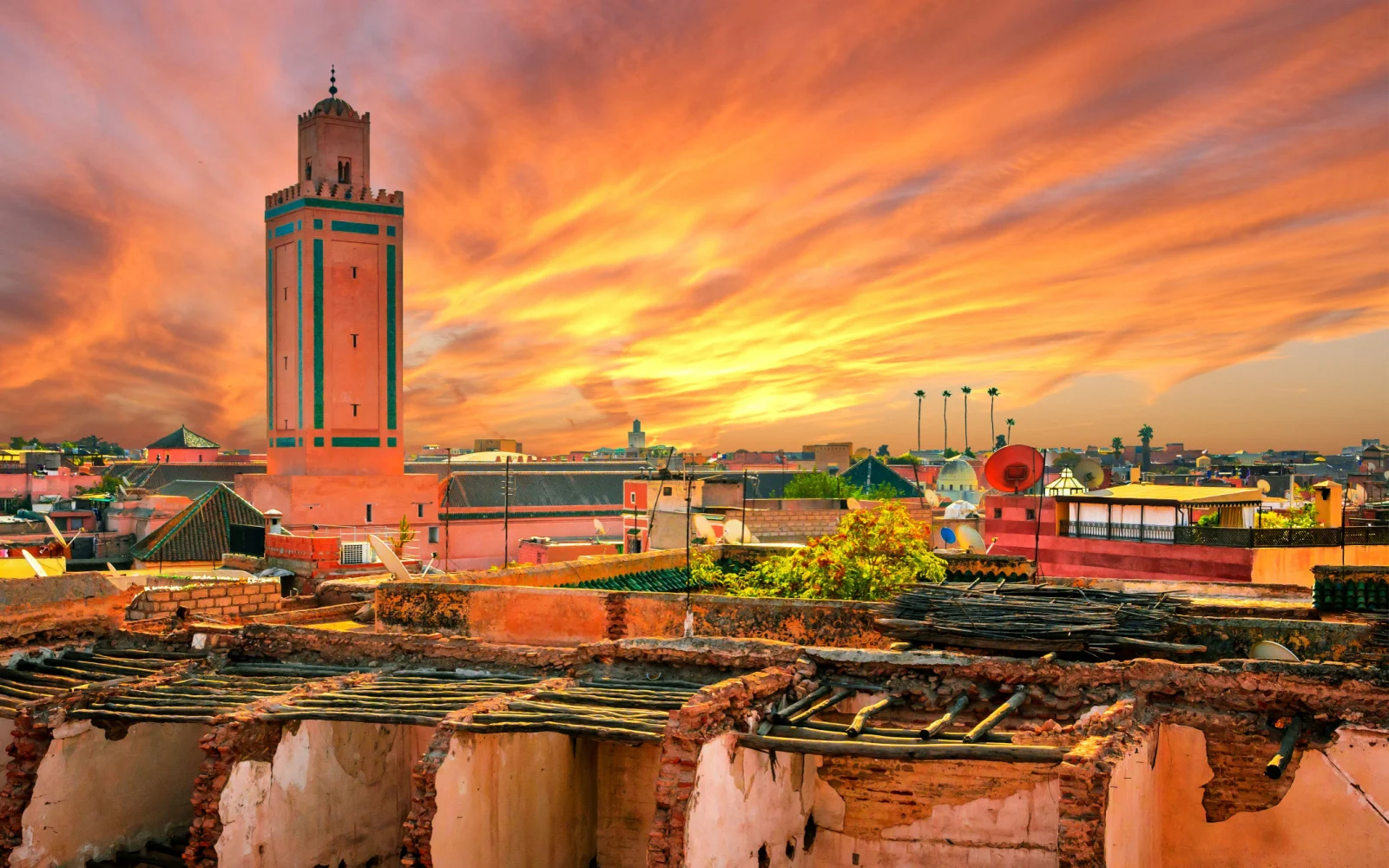Marrakech is one of Morocco’s most popular tourist destinations. Approximately 3 million tourists touch down in its international airport every year, and they certainly have a lot to see once they arrive.
Marrakech was one of the imperial centers of Morocco, so it is full of landmarks from this era, such as the elaborate Bahia Palace, the ruins of El Badi Palace, and old quarters such as the Jewish Mellah.
Marrakech for decades was a destination for bohemians and artists of all kinds, and you can see them celebrated in museums such as the Muse Yves Saint Laurent and Jardin Majorelle.
Get a taste for traditional Morocco by visiting the Souk Semmarine, one of the many hammams, and restaurants serving traditional cuisine.
Marrakech is a beautiful city, but it is also a big city where normal people live and work, with the same problems you will encounter in any city around the world. You might be worried about any safety challenges you could encounter while visiting Marrakech.
But don’t worry — our travel experts created this guide to help you figure out if Marrakech is safe for you to visit or not. Keep reading to learn more about any safety challenges you might face, including crime.
Is Marrakech Safe to Visit in 2024?
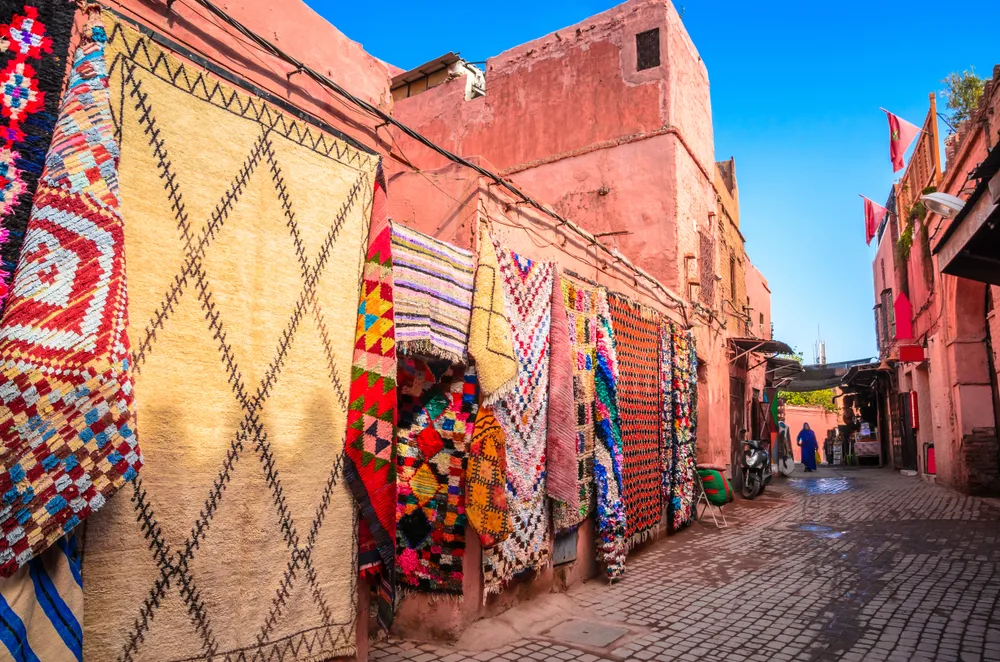
Olena Znak/Shutterstock
Yes. Marrakech is mostly safe to visit, which you can tell from the massive number of visitors that come through the city each year!
However, the city is notorious for its high rate of petty crime. You will need to keep a close eye on your valuables while you are in town. But don’t worry — it’s not as hard as it sounds.
Common problems tourists report when visiting Marrakech include:
- Pickpocketing
- Bag snatching
- Scams
- Fraud
- Harassment by touts and souk sellers
- Sexual harassment
- Terrorism
The city can be overwhelming, especially if you are struggling to hold on to your wallet, but it is not dangerous per se. Rates of violent crime are fairly low. It helps that overall; the country of Morocco is safe for visitors.
The United Kingdom mentions in its travel advisory that hundreds of thousands of UK citizens travel to Morocco each year, and most encounter no problems while they visit.
Other countries are more cautious when they give travel advice for visiting Morocco, the country in which Marrakech is located. The United States advises citizens to exercise increased caution in Morocco due to the risk of terrorism.
However, terrorism in Morocco is most common in remote areas such as the Atlas Mountains, not big cities.
The last terrorist attack in Marrakech was in 2011, when a terrorist group planted a bomb in popular Djemaa el-Fna square, killing several tourists. However, there has not been an attack in over a decade.
After the bombing, Morocco heavily stepped up law enforcement presence in major tourism areas and anti-terrorism activities. Marrakech certainly has its problems, and many tourists emerge from the city a little bit poorer.
However, violent incidents, including terrorism, are rare — rarer than in many Western cities. Tourist police heavily patrol popular destinations within the city, adding an extra layer of security.
Crime in Marrakech
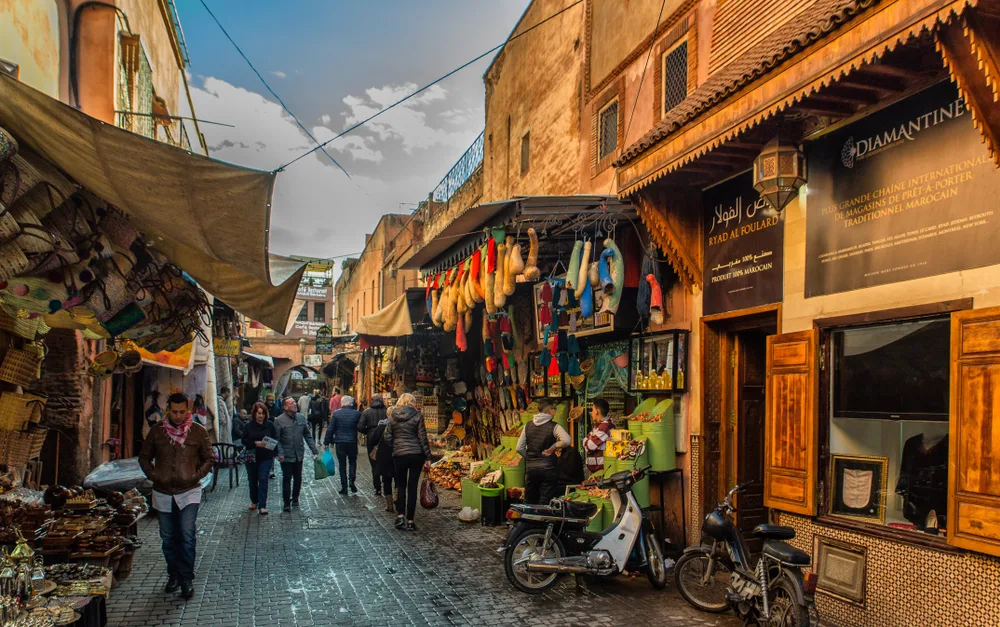
Marrakech Morocco 10.04.2018 – People walking on a corridor surrounded by booths and stalls in Jemma Dar Fna, Marrakech/PhotopankPL/Shutterstock
Taking a deep dive into the crime data for Marrakech can help you get peace of mind when it comes to stronger safety challenges, and help you be aware of which challenges you need to watch out for.
A good place to start is the site Numbeo, which creates its crime index based on responses from real people living in the cities and countries it analyzes.
Marrakech scores a 41.21 out of 100 on the site’s crime index, which is a moderate value. Respondents mostly worry about property crimes such as drug abuse, vandalism, and theft, although there is a moderate concern for muggings and robbery as well.
Overall, the violent crime rate in Morocco is low, which means that it will be low in cities such as Marrakesh. The homicide rate in Morocco is just 1.24 incidents per 100,000 people.
The homicide rate in Marrakesh is similarly low. Rates of other violent crimes are comparatively low, although anecdotal evidence reports a slight increase in armed robberies targeting tourists in the city.
Marrakech is one of the safer big cities in Morocco to visit. It has a lower crime rate than other cities such as Casablanca. Plus, it is safer to visit than rural areas of Morocco, which are more likely to be terrorism hot spots.
It is true that Marrakech has a very high rate of petty theft and similar crimes. Socioeconomic factors are often responsible as tourists tend to be much wealthier than local residents, providing an attractive target for criminals, scammers, and people pushed into desperate acts by poverty.
According to local news, Marrakech has the lowest standard of living for locals in Morocco, pushing many people towards crime. The overall crime prognosis for Marrakech is optimistic.
In 2022, crime in Morocco overall dropped by 30.22%. This drop in crime is reflected in a drop in Marrakech’s crime numbers.
Plus, as part of a nation-wide campaign against crime, the Moroccan government strengthened regional judicial police brigades, including the one in Marrakech, and empowered them to tackle crimes such as corruption and bribery.
Hopefully, these statistics and official information can help you gain peace of mind when traveling to Marrakech.
While you should keep a close eye on your valuables, you don’t need to worry about threats to your personal safety or physical security in Marrakech (as long as you take the right precautions).
Petty Theft
The most likely crime you will encounter in Marrakech is petty theft. Pickpocketing, theft from the back of motorcycles, and bag snatching are common throughout Morocco, and Marrakech is no different.
In its travel advisory for Morocco, the Canadian government lists the possibility of petty crime in many Moroccan cities. Popular areas for theft include markets, medinas, and parks.
These parts of Marrakech are also common areas of theft. Be particularly careful in popular tourist areas such as the Djemaa el-Fna, the medina, and markets such as the Souk Semmarine or Souk des Tanneries.
These areas are crowded, providing perfect cover for pickpockets and bag snatchers. Whenever you are walking around Marrakech, especially when you are in areas that you know are theft hotspots, take precautions to make sure that your valuables are safe.
Opt for a money belt or secure cross-body bag to hold your valuables. The Canadian government in its safety advice tells travelers to avoid a purse at all, if possible.
Always keep some cash away from your wallet so you have a back-up option in case you get robbed. Also be sure to make copies of all of your documents for the same reason.
Never leave your valuables unattended, even for a few seconds, as expert thieves can take advantage of even a second of distraction. If you sit down to eat in a café, hold your purse in your lap, never hanging off the back of your chair.
Robberies from the backs of motorcycles happen in Marrakech, as they do in most other Moroccan cities. To prevent this from happening to you, be sure to carry your bag on the opposite side of your body from the road. If possible, walk far away from the curb.
Scams
Scams are another common crime in Marrakech. This type of crime particularly targets tourists. The Australian government actually lists Marrakech as a hotspot for crime in Morocco, along with other popular tourist destinations.
These areas attract a lot of tourists, creating the perfect opportunities for scammers to operate. One of the most common scams in Marrakech is the fake tour guide scam.
A local will offer to show you a special “hidden gem” of Marrakech, only to get you lost in the medina and charge you an exorbitant price.
Or someone will say that the attraction you are looking for is closed and offer to take you somewhere else, then charging you a high price and getting a commission from the new place. Whenever someone approaches you in the city offering to give you directions, politely decline or ignore them.
These people rarely have good intentions. If you are lost, ask a family or woman for directions as scammers are usually young men. Souks are also common hotspots for scammers in Marrakech.
Touts will stand in front of shops and aggressively chat with customers to get them to buy something. Prices in the souks are often inflated, especially once sellers see that you are a foreigner.
Only stop in front of shops where you intend to buy something, otherwise you might find yourself walking away with something you didn’t want. Tourist hotspots such as Djemaa el-Fna attract lots of scammers.
In the square, don’t interact with people offering to take photos of you with their snake or monkey, as they charge a lot of money, and their animals are often mistreated.
The square also has henna women, who spill some ink on tourists then offer to fix it with a full tattoo, charging a lot of money in the end.
Avoid most of the vendors in the square as they are often tourist traps. Finally, be careful when taking taxis. Always agree on the price ahead of time or ask the taxi driver to turn on the taxi meter.
Avoiding Bad Areas
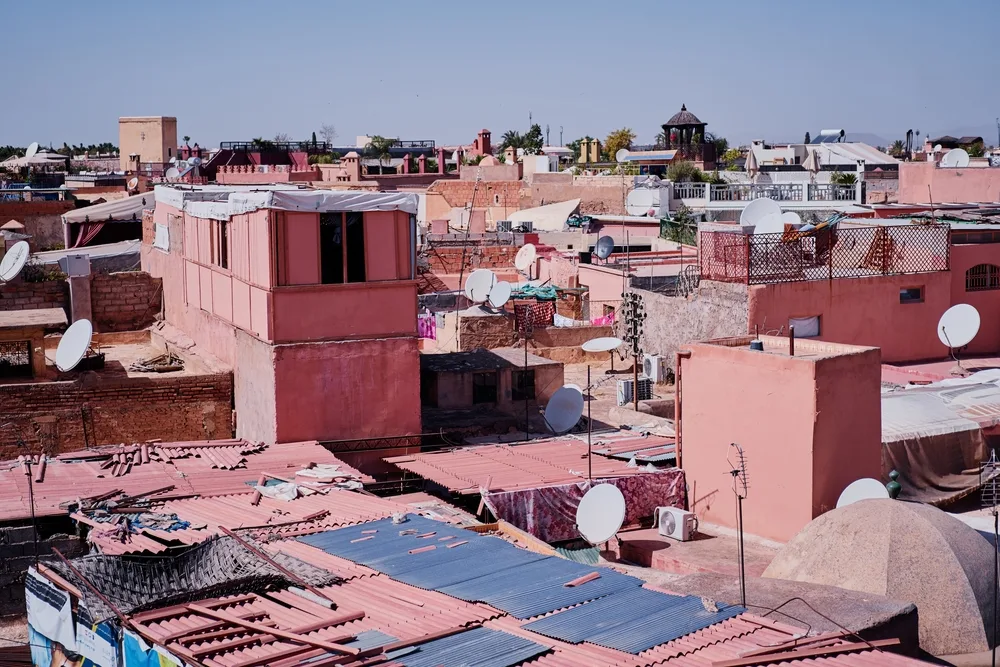
Kudla/Shutterstock
Knowing which areas are dangerous will help you avoid encountering any trouble when visiting Marrakech. The medina is one of the main tourist attractions in the city, but don’t go there at night (after 10 pm).
The narrow, poorly lit streets become even harder to navigate, even for local policemen, creating the perfect environment for robbers.
The center of Marrakech is mostly safe, but a lot of the suburbs are dodgy. Avoid neighborhoods such as Al-Azzouzia, which is a poor suburb that also has a high population of Salafists.
Things to Consider
Here are some additional safety tips to help you ensure that your trip to Marrakech will be a good one:
- Only carry what you need for the day. Leave extra cash and cards in your hotel safe. Leave behind any flashy valuables, such as jewelry or watches, in your hotel, or don’t bring them to Marrakech at all.
- Be careful when trying Moroccan food as some travelers have gotten food poisoning in Marrakech. Avoid the area around Djemaa el-Fna as these tourist traps pay less attention to hygiene. Look for places that have reasonably big crowds of locals.
- Don’t drink the tap water in Marrakech. Opt for bottled or filtered water instead.
- The weather in Marrakech can get very hot and dry. Stay hydrated and wear plenty of sunscreen. Avoid traveling there during the summer, when temperatures are most extreme.
Frequently Asked Questions
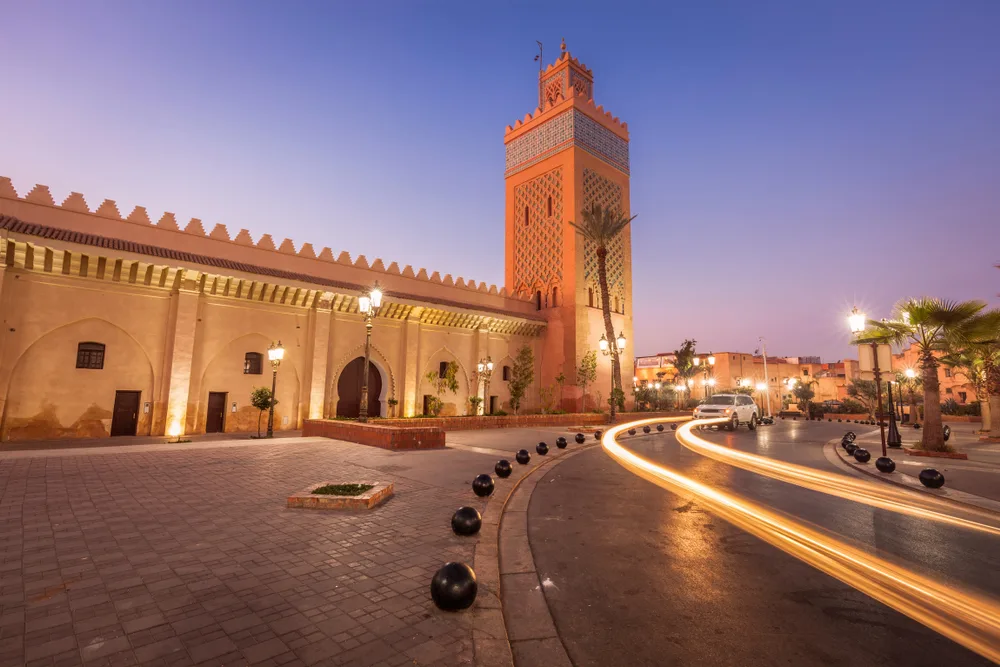
Henryk Sadura/Shutterstock
Here are some common questions you might want to ask before going to Marrakech:
Is Marrakech safe for females?
Marrakech is a safe destination for female travelers, and many women visit Morocco solo. You will probably encounter verbal street harassment, and shouldn’t walk alone at night, but besides that, you will encounter few other problems.
Is Marrakech safe in 2023?
Yes, Marrakech is safe to visit in 2023. After the crime rate declined drastically in 2022, it is probably safer to visit than ever.
What should you not wear in Marrakech?
Marrakech is a Muslim city, and the conservative dress code applies to everyone. Avoid shorts, tight clothing, and shirts that reveal your shoulders or chest.
How safe is Morocco for tourists?
Overall, Morocco is safe for tourists. While some remote areas are more dangerous, popular tourist destinations are heavily patrolled by police, who have an interest in keeping tourists safe.
Can you kiss in Marrakech?
The conservative cultural attitudes in Marrakech apply to public displays of affection as well. Kissing in public is frowned upon, including for heterosexual married couples.
So, Is It Safe to Visit Marrakech?
For the most part, Marrakech is safe to visit. The city has a high level of petty theft, from pickpocketing to scams, but as long as you stay vigilant, you should have a great time. So what are you waiting for — book your trip today!



